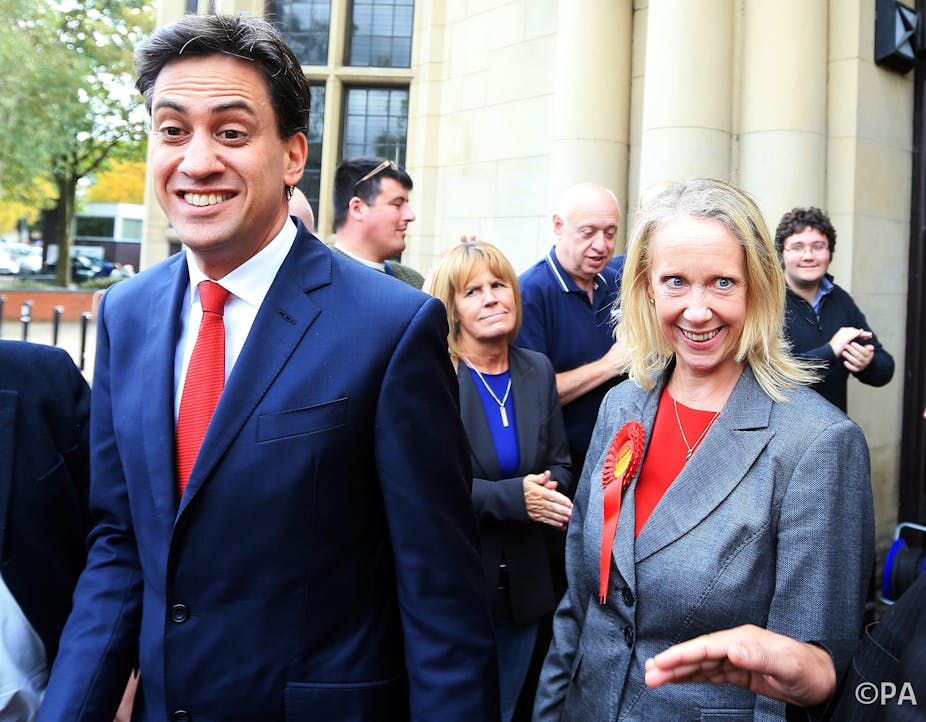“Something big is happening here.”
Those were the words of Nigel Farage following the news that Douglas Carswell had become UKIP’s first member of parliament by attracting 21,113 votes in the Clacton by-election.
While his victory came via a 60% swing from the Conservatives to UKIP, it was in many ways unsurprising given that Carswell had swung that way himself just a few months ago, resigning as Conservative MP for the Essex coastal town when he defected to UKIP.
But some 200 miles away, something even more significant was happening in another by-election. In Heywood and Middleton, a small constituency on the outskirts of Manchester, Liz McInnes just held the seat for Labour despite UKIP’s John Bickley winning 11,016 votes – a 17.65% swing from Labour that cut its majority to a mere 617 votes.
Something big is indeed happening here – and clearly, it’s not just the Conservatives who should be looking over their shoulders.
Labour pains
Following McInnes’ victory, Labour leader Ed Miliband once again chose to deride UKIP, stating that this new party could “not represent the interests of working people”. Maybe so - but it’s hard to see how the Labour Party can realistically make that claim.
This is a party that has actively sought to distance itself from its working-class roots and traditional constituencies ever since the embryonic years of the New Labour project, drifting ever closer to the centre right. No-one who has watched Labour develop over the last two decades could claim that today’s party is any more representative of working people than UKIP.
And the problem isn’t just Miliband’s, despite “something big” undeniably happening, neither Ed Miliband, David Cameron nor Nick Clegg appear to be taking the threat posed by UKIP as seriously as they surely should. Neither do any of them appear to understand why increasing numbers of people are choosing to vote for UKIP.
In their book, Revolt on the Right Robert Ford and Matthew Goodwin identify three main drivers of support for UKIP: anger at Europe, anger about immigration, and anger and disillusionment with the entire political system – including the mainstream parties and their politicians.
But still, Cameron has predictably continued to argue that every vote for UKIP is a vote for Labour. And still, following his attack on UKIP, Miliband had the hubris to turn his sights on the Conservatives by remarking that they had lost in their “own back yard” – after UKIP had humiliated Labour in theirs.
Neither leader seems to realise that this tit-for-tat sniping will just further fuel the anger and disillusionment felt by a growing tranche of the electorate.
Comms failure
Despite all the derision and dismissals, it is becoming increasingly clear that the mainstream political parties are failing to communicate a clear and coherent argument for not voting UKIP. Rarely going beyond merely reprimanding the electorate by telling them not to vote for UKIP because they’re bad – or maybe mere fruitcakes – the current climate is reminiscent of the 2006 local elections, when the British National Party contested 13 seats in Barking and Dagenham.
In the run-up to those elections, numerous big-name politicians from across the Lib-Lab-Con mainstream made a series of cameo appearances in the borough. Each delivered the same mantra: don’t vote BNP, they’re bad. When the results came in, it was clear the electorate had ignored the reprimand – the BNP won 11 of the 13 seats.
Of course, as with the BNP vote in Barking and Dagenham, so UKIP’s vote might fall away as quickly as it came. But unlike the BNP, Farage’s predictions of electoral groundswells have been proven right more often than wrong. Given the fact that UKIP won the 2014 European elections – gaining seats in England, Wales and Scotland – and has now elected a member of parliament for the first time, something big is really happening here.
If nothing else, the major parties need to take a long, hard look at themselves and their messages. And above all, maybe now is the time for Ed Miliband to look at Farage and UKIP and ask just how a public school-educated former commodities broker fronting a defiantly right-wing political party can claim to represent ordinary working people.
Some strong arguments, backed up by moral force and credible policies, and an end to the pointless jibes at the Conservatives and Lib Dems, might make a good first step.

